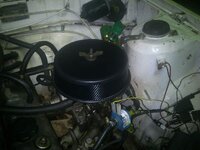the problem with Lynas is simply fallout. what happens is that you need to entomb the wastes with land. and the land is more or less unusable.
IF it is so safe, and the scientists can manage it so well. Why don't they build Lynas in Australia? why ship back and forth Malaysia and Australia? Clearly the Australians are not stupid.
1. Lynas won't explode or anything like that.
2. Tsunami or earthquake come also, won't have risk of nuclear fallout like Japan
3. It is damn safe to work there, I also don't mind
4. The real issue is that the land Lynas is sitting on will be unusable, well, you can use it but over the span of a century your offsprings might grow an extra limb.
The main argument I have against Hybrids is that, its a marketing ploy really, it doesn't offer anything that we don't already have.
1. Fuel efficiency of hybrids - Have you seen turbo diesels? You get mileage AND torque. Also, hybrids are not efficient once you start pushing it. Turbo diesels are fuel efficient regardless, the torque is just there.
2. Low emissions - yes, hybrids ARE lower, diesels are not that far off. however, let's look at the next point
3. Fuel sources - Hybrids run on petrol, which is your normal dinosaur derived liquid, diesel can run B100, which is 100% vegetable/animal derived diesel fuel.
4. Damage to manufacture/dispose - hybrids need batteries, that needs lots of rare earth minerals which causes permanent damage to the land, also disposing of the batteries is additional headache. Diesels are just same as any other petrol engine car.
The Chevy volt on the other hand, is another class of its own. The Nissan Leaf may have batteries but that's got a different concept - as it is powered purely by electricity, one can argue the power is derived from solar or wind. At least I feel these has something more to offer than hybrids.
IF it is so safe, and the scientists can manage it so well. Why don't they build Lynas in Australia? why ship back and forth Malaysia and Australia? Clearly the Australians are not stupid.
1. Lynas won't explode or anything like that.
2. Tsunami or earthquake come also, won't have risk of nuclear fallout like Japan
3. It is damn safe to work there, I also don't mind
4. The real issue is that the land Lynas is sitting on will be unusable, well, you can use it but over the span of a century your offsprings might grow an extra limb.
The main argument I have against Hybrids is that, its a marketing ploy really, it doesn't offer anything that we don't already have.
1. Fuel efficiency of hybrids - Have you seen turbo diesels? You get mileage AND torque. Also, hybrids are not efficient once you start pushing it. Turbo diesels are fuel efficient regardless, the torque is just there.
2. Low emissions - yes, hybrids ARE lower, diesels are not that far off. however, let's look at the next point
3. Fuel sources - Hybrids run on petrol, which is your normal dinosaur derived liquid, diesel can run B100, which is 100% vegetable/animal derived diesel fuel.
4. Damage to manufacture/dispose - hybrids need batteries, that needs lots of rare earth minerals which causes permanent damage to the land, also disposing of the batteries is additional headache. Diesels are just same as any other petrol engine car.
The Chevy volt on the other hand, is another class of its own. The Nissan Leaf may have batteries but that's got a different concept - as it is powered purely by electricity, one can argue the power is derived from solar or wind. At least I feel these has something more to offer than hybrids.

 I keep gloating about my 3-speed auto doing 15km/L.
I keep gloating about my 3-speed auto doing 15km/L. 

